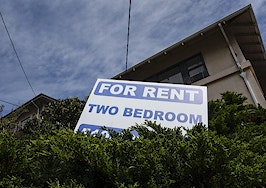Thousands of homes are sitting vacant in San Francisco, and the city could incentivize owners to rent them out by charging a tax on vacant housing units, according to a recent report in the city.
The Golden City could collect close to $39 million by taxing vacant residential properties, according to the report, which found there were over 40,000 vacant homes in the city, or about 10 percent of the entire housing stock of California’s fourth most-populous city.
The effort has implications for investment property owners in the region and, if it reaches the municipal ballot and is approved by voters, it would apply to condos and apartment buildings, not duplexes or single-family homes.
“Assuming an estimated 4,600 to 7,300 vacant units in San Francisco that would be subject to a vacancy tax, we estimate San Francisco could generate between $12.2 and $61.2 million per year in net revenue initially,” the report said.
The report was commissioned amid an ongoing shortage of affordable housing in the Bay Area. It found the number of vacant homes in the city increased by 20 percent between 2015 and 2019.
San Francisco voters would get the final say on whether to approve what’s known as an “empty homes tax.” Supporters first must collect nearly 9,000 signatures before July. Voters recently approved a similar tax on commercial properties in the city.
A residential tax could target property owners who are holding valuable housing stock vacant as investments, or what the report called “cash havens.”
The ballot measure would apply to buildings with more than two residential units.
“The empty homes tax is intended to disincentivize prolonged vacancies, thereby increasing the number of housing units available for occupancy, while also raising funds for rent subsidies and affordable housing,” the ballot measure supporters wrote.
More than 8,000 housing units were owned but not occupied, and the city had two reasons to believe that’s the case: The homes were either new-builds that are purchased and not yet finished and ready to be occupied, the city said.
“But it may also be due to owners purchasing them as investments or cash havens with no intention of moving in or renting them out,” the report said. “In such a situation, a City policy intervention may be useful to incentivize the conversion of some of these units to occupied housing.”
Who else uses an ’empty homes tax?’
The effort to enact a tax on vacant residential properties follows efforts in other North American cities to use it to disincentivize property owners who wait for values to rise before putting residential property or vacant land to use.
Such a tax has raised millions in Oakland, California, and Washington, D.C.
It also may have helped to bring more homes into the rental market in Vancouver, British Columbia, which levies what it calls an “empty homes tax.”
In each year since the tax was created in 2017, the number of vacant homes dropped, from a high of 2,193 to 1,627 in 2020, the most recent year data is available. Homes are exempt from the tax if they were recently bought or sold or if they’re under construction.
Washington charges $5 for every $100 of a home’s assessed value if the home has been sitting vacant. The city reported generating $9.4 million in gross revenue in 2016. Oakland raised $7.3 million in 2020 with its tax, the report said.
San Francisco already has a similar tax on commercial properties. The empty homes tax envisioned by the ballot measure would be tied to the size of each unit, and the tax would increase annually through 2026, topping out at $20,000 for units that are larger than 2,000 square feet. The tax would then be indexed to inflation.
The tax would apply to homes that are vacant for more than half the year.
The report showed builders have been proficient at adding market-rate housing, but the city isn’t close to meeting regional affordable housing goals.













